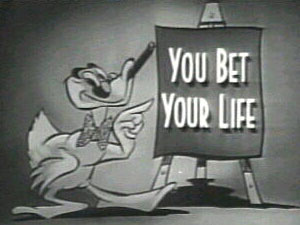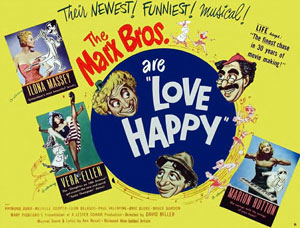
Julius Henry "Groucho" Marx was an American comedian, actor, writer, stage, film, radio, and television star. He is generally considered to have been a master of quick wit and one of America's greatest comedians.

George Simon Kaufman was an American playwright, theatre director and producer, humorist, and drama critic. In addition to comedies and political satire, he wrote several musicals for the Marx Brothers and others. He won the Pulitzer Prize for Drama for the musical Of Thee I Sing in 1932, and won again in 1937 for the play You Can't Take It with You. He also won the Tony Award for Best Director in 1951 for the musical Guys and Dolls.

The Marx Brothers were an American family comedy act that was successful in vaudeville, on Broadway, and in motion pictures from 1905 to 1949. Five of the Marx Brothers' thirteen feature films were selected by the American Film Institute (AFI) as among the top 100 comedy films, with two of them, Duck Soup (1933) and A Night at the Opera (1935), in the top fifteen. They are widely considered by critics, scholars, and fans to be among the greatest and most influential comedians of the 20th century. The brothers were included in AFI's 100 Years... 100 Stars list of the 25 greatest male stars of Classical Hollywood cinema, the only performers to be inducted collectively.

Animal Crackers is a 1930 American pre-Code Marx Brothers comedy film directed by Victor Heerman. The film stars the Marx Brothers, Groucho, Chico, Harpo, and Zeppo, with Lillian Roth and Margaret Dumont. It was based on their broadway musical of the same name, in which mayhem and zaniness ensue when a valuable painting goes missing during a party in honor of famed African explorer Captain Jeffrey T. Spaulding. A critical and commercial success upon its initial release, it was filmed at Paramount's Astoria Studios in Astoria, Queens; it was the second of two films the Brothers would make in New York City.

Arthur "Harpo" Marx was an American comedian, actor, mime artist, and musician, and the second-oldest of the Marx Brothers. In contrast to the mainly verbal comedy of his brothers Groucho Marx and Chico Marx, Harpo's comic style was visual, being an example of both clown and pantomime traditions. He wore a curly reddish blond wig, and never spoke during performances. He frequently used props such as a horn cane, made up of a pipe, tape, and a bulbhorn, and he played the harp in most of his films.

Leonard Joseph "Chico" Marx was an American comedian, musician, actor and film star. He was a member of the Marx Brothers. His persona in the act was that of a charming, uneducated but crafty con artist, seemingly of rural Italian origin, who wore shabby clothes and sported a curly-haired wig and Tyrolean hat. On screen, Chico is often in alliance with Harpo, usually as partners in crime, and is also frequently seen trying to con or outfox Groucho. Leonard was the oldest of the Marx Brothers to live past early childhood. In addition to his work as a performer, he played an important role in the management and development of the act in its early years.

Herbert Manfred "Zeppo" Marx was an American actor, comedian, theatrical agent, and engineer. He was the youngest and last survivor of the five Marx Brothers. He appeared in the first five Marx Brothers feature films, from 1929 to 1933, but then left the act to start his second career as an engineer and theatrical agent.
Hello, I Must Be Going may refer to:

Margaret Dumont was an American stage and film actress. She is best remembered as the comic foil to the Marx Brothers in seven of their films. Groucho Marx called her "practically the fifth Marx brother".
Lyn Erhard, better known under the pen name of Charlotte Chandler, is an American biographer and playwright. Chandler authored biographies of Groucho Marx, Federico Fellini, Billy Wilder, Bette Davis, Marlene Dietrich, Joan Crawford, Ingrid Bergman, Mae West and Alfred Hitchcock.

Richard Alva Cavett is an American television personality, comedian and former talk show host notable for his conversational style and in-depth discussions. He appeared regularly on nationally broadcast television in the United States for five decades, from the 1960s through the 2000s.

You Bet Your Life is an American comedy quiz series that aired on both radio and television. The original and best-known version was hosted by Groucho Marx of the Marx Brothers, with announcer and assistant George Fenneman. The show debuted on ABC Radio on October 27, 1947, then moved to CBS Radio debuting October 5, 1949, before making the transition to NBC-TV and NBC Radio on October 4, 1950. Because of its simple format, it was possible to broadcast the show on both radio and television but not simultaneously. Because many of the laughs on the television show were evoked by Groucho's facial reactions and other visual gimmicks, the two versions were slightly different. The last episode in its radio format aired on June 10, 1960. On television, however, the series continued for another year, debuting in its final season on September 22, 1960, and with a new title, The Groucho Show.

Love Happy is a 1949 American musical comedy film, released by United Artists, directed by David Miller and starring the Marx Brothers in their 13th and final feature film.
Erin Leslie Fleming was a Canadian actress best known as the companion and manager of Groucho Marx in his final years.
Arthur Julius Marx was an American author, a nationally ranked amateur tennis player, and son of entertainer Groucho Marx and his first wife, Ruth Johnson. He was named after Groucho's brother Arthur "Harpo" Marx.
I'll Say She Is (1924) is a musical comedy revue written by brothers Will B. Johnstone and Tom Johnstone (music). It was the Broadway debut of the Marx Brothers. A revival of I'll Say She Is, as "adapted and expanded" by the writer-performer Noah Diamond, was seen Off Broadway at the Connelly Theater in 2016.
"Hello, I Must Be Going" is a song from the Marx Brothers' 1930 film Animal Crackers, written by Bert Kalmar and Harry Ruby. It was sung by Groucho, along with Margaret Dumont, just before the dialogue that preceded the song "Hooray for Captain Spaulding". It did not feature in the earlier stage production of Animal Crackers which opened on Broadway in 1928.
Robert Pirosh was an American motion picture and television screenwriter and director.
Allen B. Gellman was a jewelry manufacturer and first sponsor of You Bet Your Life, the radio program hosted by Groucho Marx. Gellman was elected to the Horatio Alger Association of Distinguished Americans in 1956.

Ennis William Cosby, the only son of American comedian Bill Cosby, was murdered on January 16, 1997, near Interstate 405 in Los Angeles, California. He was shot in the head by 18-year-old Mikhail Markhasev in a failed robbery attempt.












